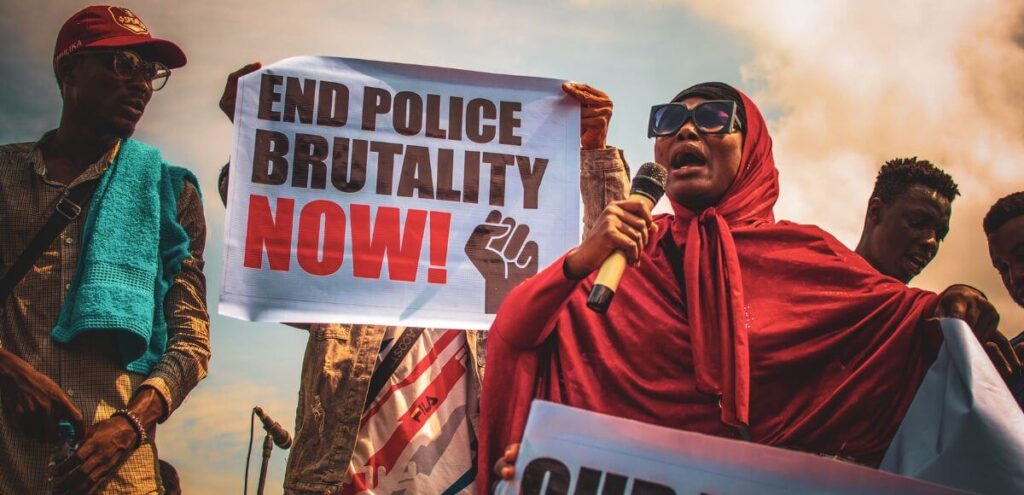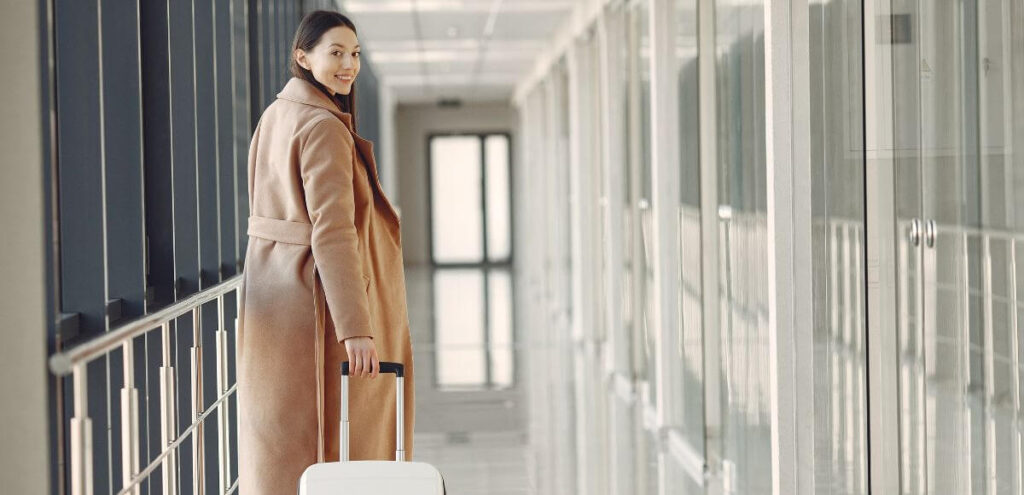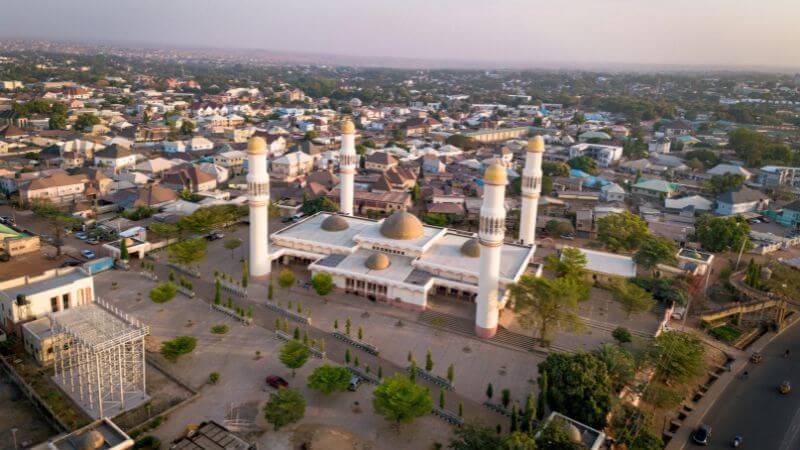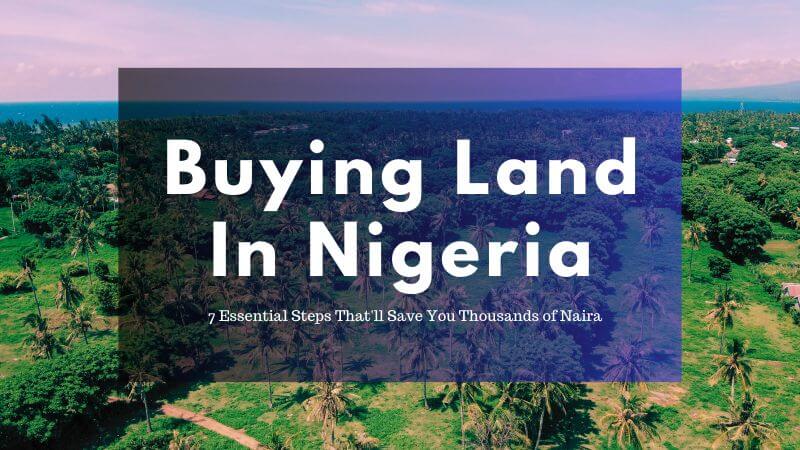Is Living in Nigeria right for me? What is the cost of living in Nigeria? Is Nigeria a safe place to live? If you’ve ever asked yourself any of these questions, then, this post is for you.
Nigeria, often referred to as the “Giant of Africa,” is a country of immense diversity, rich culture, and boundless opportunities. As Africa’s most populous nation and largest economy, Nigeria presents a unique blend of traditions, modernity, economic potential, and daily challenges that make life here truly extraordinary.
Whether you’re an expat considering a move, a Nigerian returning home, or simply curious about this dynamic country, this comprehensive guide will provide you with everything you need to know about living in Nigeria.

Where is Nigeria?
Nigeria is strategically located in West Africa, bordering the Gulf of Guinea between Benin and Cameroon. It shares land borders with Niger to the north, Chad to the northeast, Cameroon to the east, and Benin to the west. With a coastline along the Atlantic Ocean, Nigeria occupies a total area of approximately 923,768 square kilometers, making it the world’s 32nd-largest country by land mass.
Nigeria facts that you should know
Before diving into the specifics of living in Nigeria, we must explain some key facts about Nigeria that should get you up to speed as a visitor or expat:
- Population: With over 200 million people, Nigeria is Africa’s most populous country and the seventh most populous nation globally.
- Capital: Abuja is the federal capital, though Lagos remains the economic and cultural hub.
- Official Language: English is the official language, facilitating communication among Nigeria’s diverse ethnic groups.
- Ethnicities: Nigeria is home to more than 250 ethnic groups, with the largest being Hausa, Yoruba, and Igbo..
- Languages: Over 500 languages are spoken across the country, reflecting its incredible linguistic diversity.
- Religion: The population is roughly split between Christianity (predominantly in the south) and Islam (predominantly in the north), with a small percentage practicing traditional faiths.
- Climate: Nigeria has a tropical climate with distinct wet and dry seasons. The southern coastal areas experience higher rainfall, while the north is drier.
- Currency: The Nigerian Naira (NGN) is the official currency.
- Government: Nigeria operates as a federal presidential republic with a multi-party system.
Why consider living in Nigeria?
Nigeria offers a unique mix of opportunities and experiences that make it an attractive destination for a lot of people. So, let’s explore four main reasons why you might want to consider moving to Nigeria:
i. Economic opportunities
Nigeria boasts Africa’s largest economy, with a GDP of over $440 billion. The country’s economic landscape is diverse and evolving:
- Oil and Gas: Nigeria is Africa’s largest oil producer, with the petroleum industry accounting for a significant portion of its GDP and export earnings.
- Technology and Innovation: Lagos is emerging as “Africa’s Silicon Valley,” with a thriving tech ecosystem and numerous startups.
- Agriculture: With vast arable land, agriculture remains a cornerstone of the economy, employing a large percentage of the population.
- Entertainment Industry: Nollywood, Nigeria’s film industry, is the second-largest in the world by volume, creating numerous opportunities in media and entertainment.
- Financial Services: Lagos is a major financial hub for West Africa, with numerous banks and financial institutions.
- Telecommunications: One of Africa’s largest telecom markets, with rapid growth in mobile and internet penetration.
ii. Rich cultural heritage
Nigeria as a nation is blessed with a unique blend of cultural diversity that will leave anybody in awe. Here are some of the key experiences that make the nation great:
- Art and Literature: Nigeria has produced world-renowned authors like Chinua Achebe and Wole Soyinka (Nobel laureate), as well as acclaimed visual artists.
- Music: From traditional sounds to Afrobeats that have taken the global stage, Nigerian music is vibrant and influential.
- Festivals: Numerous cultural celebrations throughout the year showcase Nigeria’s rich heritage, including the Durbar Festival, Eyo Festival, New Yam Festival, and Calabar Carnival.
- Cuisine: Nigerian food is diverse and flavorful, featuring dishes like jollof rice, egusi soup, suya, and pounded yam with various soups.
- Fashion: Nigeria’s fashion industry is innovative and colorful, with traditional attire like agbada, iro, and buba, and Ankara fabrics gaining international recognition.
iii. Tourism & natural attractions
Despite being known for its urban centers, Nigeria is also blessed with 100s of stunning natural tourist attractions and recreational sites:
- Beaches: From the pristine shores of Calabar to the vibrant beach scene in Lagos, Nigeria’s coastline offers beautiful waterfronts.
- Waterfalls: Sites like Erin Ijesha Waterfall (Osun State) and Agbokim Waterfalls (Cross River State) showcase Nigeria’s natural splendor.
- National Parks: Yankari Game Reserve, Cross River National Park, and Gashaka-Gumti National Park are home to diverse wildlife and ecosystems.
- Idanre Hills: These ancient rock formations in Ondo State offer breathtaking views and insights into Nigeria’s geological history.
- Plateaus and Highlands: The Jos Plateau provides a cooler climate and scenic landscapes.
iv. Warm hospitality
One known fact about the Nigerian people is that they are very welcoming, friendly, and easy-going. So, depending on your personality type and needs, you’ll never have a dull moment living in Nigeria. Here are some ideas to expect:
- Community-Oriented Culture: Nigerians value family and community connections, often extending hospitality to newcomers.
- Vibrant Social Life: From traditional ceremonies to modern nightlife, there’s always something happening.
- International Communities: Major cities host established expatriate communities that can ease the transition for newcomers.
The realities of daily life in Nigeria
Now let’s consider the true realities of everyday life when living in Nigeria. It is very important to note that Living in Nigeria comes with its share of unique rewards and challenges. So, let’s deep dive into things to expect from living in Nigeria as an expat:
Housing and accommodation
Finding suitable housing is one of the first considerations when moving to Nigeria. Major cities offer a range of options from high-rise apartments to detached houses. Many expatriates and middle to upper-class Nigerians opt for gated estates with enhanced security and amenities.
It is also important to know that Nigeria still faces a big challenge in the power sector, which means that you should not expect a 24-hour uninterrupted power supply – however, many homes rely on generators or solar systems to supplement the sometimes inconsistent national grid.
Transportation
Understanding the Nigerian transportation system can be a major advantage when you start living in Nigeria. Many people rely on a mix of private cars, Taxis/Ride-hailing services, and public transport. Here are some other key pointers to keep in mind:
- Traffic Congestion: Major cities, especially Lagos, are known for heavy traffic during peak hours.
- Ride-hailing Services: Uber, Bolt, and local alternatives like InDrive are widely available in major cities.
- Public Transportation: Options include buses, “danfo” minibusses, and in Lagos, the Bus Rapid Transit (BRT) system. Motorcycles (okadas) and three-wheeled vehicles (keke napeps) are also common in some rural areas, though restrictions exist in certain cities.
- Air Travel: Domestic flights connect major cities, with Lagos, Abuja, and Port Harcourt serving as key hubs.
Healthcare
Access to quality healthcare is an important area to pay attention to when living in Nigeria. While the country has some excellent private hospitals, especially in urban areas, the public healthcare system faces challenges. However, as an expatriate, it’s best to opt for international health insurance coverage.
Malaria prevention is also an area you need to pay attention to, with precautions like mosquito nets, repellents, and prophylactic medication recommended. You can always find well-stocked pharmacies available in major urban areas.
Education In Nigeria
Nigeria has various educational options, with major cities having international schools following British, American, or IB curricula, catering primarily to expatriate families and affluent Nigerians. However, the public education system, popularly called Government schools still faces challenges with infrastructure and resources.
You will also find many opportunities to learn foreign languages like German, French, etc., and even other local languages like Yoruba, Hausa, or Igbo.
Cost of living in Nigeria
Understanding the real cost of living in Nigeria is very crucial for expats and anyone considering moving to Nigeria. While some aspects of life can be relatively affordable, others might surprise you with their expense. Here’s a quick breakdown of a tentative cost of living in Nigeria:
Please note that this breakdown is a result of March 2025 – with the Naira/Dollar exchange rate at ₦1550/$1.
Housing costs
- Rent: This will vary largely depending on location and amenities. In upscale areas of Lagos or Abuja, a three-bedroom apartment can range from ₦3,000,000 to ₦10,000,000 ($2,000 to $7,000) annually.
- Utilities: Monthly costs for electricity, water, internet, and gas for a family can range from ₦100,000 to ₦200,000 ($65 to $130).
- Security: Additional costs for security services in gated communities.
Food and groceries
- Buying fresh produce, meat, and staples from local markets is cost-effective depending on your needs, while International supermarkets offer imported goods at premium prices.
- Dining Out: A meal at a mid-range restaurant costs around ₦5,000 to ₦10,000 ($3.26 to $6.51) per person.
- Street Food: Affordable local options are available from ₦500 to ₦2,000 ($0.33 to $1.30).
Transportation
- Fuel: Prices fluctuate but significantly impact transportation costs.
- Taxis: Ride-hailing services cost between ₦4,000 to ₦15,000 ($2.61 to $9.77) for average trips within cities.
- Public Transport: More affordable but less convenient, with fares ranging from ₦100 to ₦1000 ($0.065 to $0.65).
- Car Purchase: Imported vehicles can be expensive due to the high exchange rate and custom duties.
Education
- International Schools: Annual fees range from ₦3,000,000 to ₦10,000,000 ($2,000 to $7,000) per child.
- Private Schools: More affordable options ranging from ₦500,000 to ₦2,000,000 ($325.75 to $1302.5) annually.
- Higher Education: University tuition varies widely, from approximately ₦150,000 to ₦2,000,000 ($97.72 to $1302.5) per year.
Healthcare
- Health Insurance: International coverage can cost between $250 to $700 annually per person.
- Private Clinic Visit: Approximately ₦15,000 to ₦30,000 ($10 to $20).
- Medications: Costs vary, but are generally affordable compared to Western prices.
Entertainment and leisure
- Cinema: Movie tickets cost around ₦2,500 to ₦5,000 ($2 to $4).
- Gym Membership: Monthly fees range from ₦20,000 to ₦100,000 ($15 to $65.15).
- Weekend Getaways: Domestic travel and accommodation can be relatively affordable.

Is Nigeria a safe place to live?
Now, let’s talk about your safety. Generally, security situations will vary significantly across the country depending on your location. Southern states generally experience different security challenges than northern states. Here are some rampant security concerns, and what you can do to avert them.
Common security concerns in Nigeria
- Petty Crime: Like many urban centers worldwide, cities like Lagos experience pickpocketing and theft.
- Traffic Safety: Roads can be hazardous due to poor maintenance and driving habits.
- Specific Regions: The northeastern region has faced insurgency issues, while parts of the Niger Delta have experienced militant unrest.
- Kidnapping: Though rare for foreigners in major cities, it remains a concern in certain areas.
NB: For more information, check out this article for Areas where foreigners are advised not to travel to – According to the UK Government travel adviser.
Safety precautions in Nigeria
Being aware of your surroundings is very essential for your overall safety when living in Nigeria. Here are some security measures you need to keep in mind:
- Local Advice: If you’re working In Nigeria, it is important to heed advice from locals and your employer regarding areas to avoid.
- Travel Companion: For travelers, ensure you keep people informed of your travel plans, and always consider traveling with locals or in groups when possible.
- Security Services: Many expatriates employ security personnel or live in estates with security measures.
- Emergency Contacts: Keep important numbers readily available.
Working and doing business in Nigeria
The job market for expats In Nigeria
For many, living in Nigeria is closely tied to professional opportunities – with many expatriates working in industries like: oil and gas, telecommunications, banking, construction, and NGOs.
Most expats are highly skilled and qualified, occupying positions in project management, HR, engineering, or IT. Those with skills in journalism, communications, and health sciences are also seeing increasing opportunities, and a majority of the foreign NGO agencies and the UN use Nigeria as their West African base.
Expat salary In Nigeria
Expats living in Nigeria can earn up to 45% higher than those in the UK or US. This is to compensate for the higher risks and costs of safety measures that come with working in an African country.
According to some sources, the average expat salary in Nigeria is US$30,000. And 12% of expat households in Nigeria are now earning more than US$250,000 per annum, with other benefits including free or subsidized accommodation, a private car with a personal driver, and other household assistants like cleaners, cooks, etc.
How to calculate income tax In Nigeria?
The monthly or annual income tax rate can very well depend on many factors like Job type, Location, duration of stay, and of-course – if your home country has any bilateral tax agreement with Nigeria. So, generally, the Income tax in Nigeria is calculated on a progressive scale from 7 to 24% of total income – depending on those factors earlier mentioned.
Most times, It might be quite complex to do all those calculations by yourself, so it’s always advised to seek the help of a qualified tax lawyer or consultant to help you sort out the right amount required of you, to avoid any penalty.
Doing business in Nigeria
As the business and economic hub of Africa, Nigeria has a lot of untapped business opportunities waiting to be explored – which makes Nigeria a safe place for innovative business ideas to thrive.
However, for any business to succeed in Nigeria, it’s very crucial to understand the business culture of the country – which includes: building personal relationships, respect for seniority and authority, welcoming negotiations, patience, and adaptability – these are some of the keys to success in the Nigerian business environment.

Understanding the Nigerian culture & tradition
As an expat living in Nigeria, making efforts to understand the Nigerian culture enhances your living experience tremendously. Here are some key areas you need to pay attention to:
Nigerian cultural values
- Family: Family bonds are extremely important, with extended family playing a significant role.
- Respect for Elders: Showing deference to older people is a cornerstone of Nigerian culture.
- Community: Community connections and mutual support networks are valued.
- Religion: Faith plays a central role in daily life for most Nigerians.
- Celebration: Life events are celebrated enthusiastically with family and community.
Nigerian social etiquette
Just like we highlighted earlier, the average Nigerian can be very welcoming and easy-going, but at the same time, they can be easily toughened up especially when they get a sense of intimidation or neglect from a visitor, so it’s very important to pay attention to some of these common social etiquettes:
- Greetings: Greetings are important and often elaborate. Take time to properly greet people, at work, social gatherings, and even on the street.
- Respect: Nigerians pay attention to titles, so endeavour you show respect by using titles (Sir, Madam, Doctor, Chief, Engr) when appropriate.
- Right Hand: Use your right hand for eating, giving, and receiving items.
- Photography: Ask permission before taking photos of people or certain locations.
- Punctuality: While “Nigerian time” may be flexible, foreigners are generally expected to be punctual.
Nigerian cuisine
Nigerian food is diverse, tasteful, and well celebrated across the globe. Each region has its special delicacies – making it one experience you don’t want to miss while in Nigeria.
Some popular dishes in Nigeria include: Jollof rice, pounded yam with egusi soup, Amala and ewedu, Tuwo shinkafa, etc. Some common street foods are suya (spiced grilled meat), moin-moin (steamed bean pudding), and akara (bean fritters), etc.
Festivals and celebrations
By default, Nigeria is a family and community-oriented country. Each month, there’s always one thing or another that is being celebrated. So, it’s important to pay attention to the Nigerian yearly event calendar, so you can plan your activities accordingly. Some common events are:
- Religious Festivals: Eid celebrations for Muslims, Christmas and Easter for Christians.
- Cultural Celebrations: Argungu Fishing Festival, Durbar Festival, Eyo Festival, New Yam Festival.
- Carnivals: Calabar Carnival, Lagos Carnival, Abuja Carnival.
- Arts and Music: Lagos Photo Festival, Felabration Music Festival, Africa International Film Festival.
- Community Events: Naming ceremonies, weddings, and funerals are important community gatherings.
Adapting to life in Nigeria: tips for expats living in Nigeria
Successfully adapting to life in Nigeria requires both practical preparation and cultural awareness, so if you’re an expat planning to move to Nigeria, here are some essential tips that will help you adapt faster:
Cultural adaptation
We can never over-emphasize this – being culturally aware as an expat living in Nigeria will not only save you some unforeseen chaos but will help you enjoy your stay in Nigeria. Here are some things you should be aware of:
- Open-mindedness: Approach differences with curiosity rather than judgment.
- Language Learning: While English is widely spoken, learning some phrases in local languages is appreciated.
- Cultural Mentors: Develop relationships with locals who can help navigate cultural nuances.
- Patience: Understand that processes may move at a different pace than what you’re accustomed to.
- Flexibility: Be prepared to adapt plans as circumstances change.
Everyday practical tips
- Reliable Power: Invest in good power backup solutions – generator or inverter system for your homes, and power banks when on the go.
- Internet Options: Have multiple internet options for consistent connectivity – Fibre for your homes & offices, and mobile data when you’re on the go.
- Transportation Planning: Allow extra time for travel due to traffic congestion.
- Cash Handling: Keep smaller denominations available for daily expenses like: roadside shopping, tipping strangers/police, etc.
- Food and Water Safety: Take precautions with food and water to avoid stomach issues.
Building a social network
- Expatriate Communities: Connect with other expatriates who can share experiences and advice. You can start by joining the Abuja or Lagos expats.
- Local Connections: Make efforts to build friendships with Nigerians.
- Professional Associations: Join industry groups related to your field.
- Social Media Groups: Many cities have active Facebook or WhatsApp groups for expatriates and newcomers.
- Community Service: Volunteering can provide fulfilling connections to the local community.
Finding accommodation in Nigeria as an expat
Housing and where to live is one of the most important decisions you will have to make as an expat living in Nigeria. So, let’s explore some available options.
Where do expats live In Nigeria?
Where you decide to live as an expat largely depends on which location you work or the area you do your business. But over the years, some of the popular locations where expats live in Nigeria are in the two largest cities; Lagos and Abuja – Followed closely by Por-Hacourt.
Here are some popular locations for each city:
- Lagos: Victoria Island, Ikoyi, Lekki, and Banana Island are popular expatriate neighborhoods.
- Abuja: Maitama, Asokoro, Wuse II, and Jabi districts offer good housing options.
- Port Harcourt: GRA (Government Reserved Area), Old GRA, and Peter Odili Road area.
- Kano: Nassarawa GRA and Badawa offer better housing options.
These areas are among the safest for living in Nigeria. And remember to always look for residences that are within expat compounds, or walled enclosures, complete with armed guards, and all-inclusive estate facilities.
How can I find accommodation in Nigeria as an expat?
For elite cities like Lagos, Abuja, and Port-Hacourt – finding a rental property is most times difficult, even for indigenes. This is because house demands always outweigh supply. And so, most expats will struggle to find Western standard accommodation for rental on their own.
So, here are our recommended ways to go about this:
- If you have been relocated by your employer, then many of them may already own or will help secure suitable homes for you as their expatriate staff, covering your rental fees and other expenses.
- Work with reputable agents – which you can find on websites like Property Pro, Private Property Nigeria, and Nigeria Property Centre. Also, bear in mind that fees may apply.
- The next option is to tap into your network connections, which often provide the best housing leads – this can be your connection with the locals or other expat communities.
Can expats buy property in Nigeria?
Yes, but that will be within the jurisdiction of the Nigerian Land Use Act of 1978 – which vests control of all land within a state’s territory in the governor of that state, effectively centralizing the authority to grant land rights. This means that Land cannot be owned privately – whether by an expatriate or indigenes. However, one can obtain leases from the State for a maximum of 99 years for the use of land.
Need help buying a property as an expat living in Nigeria?
Contact LiN Property for a free consultation on the best property to buy in Nigeria.

Traveling to Nigeria: Entry Requirements for expats
So, now you’re ready to travel to Nigeria! Here are some essential entry requirements that you need to put in place before setting out:
i. Visa requirements
Remember the processing time varies depending on the visa type, so you might be required to wait a few weeks for your visa to be processed.
- Types of Visas: Options include business, tourist, temporary work permit (TWP), and subject to regularization (STR) visas. For most expats, the STR visas are most likely the one you’d need.
- Documentation: Requirements typically include a passport, photographs, invitation letters, and proof of funds.
- Biometrics: Many countries now require biometric data collection for Nigerian visa applications.
- Visa on Arrival: Available for businesspeople from certain countries, but must be pre-arranged.
ii. Health requirements
Yellow fever vaccination is mandatory for coming into Nigeria. Other recommended vaccinations include hepatitis A and B, typhoid, meningitis, and routine immunizations.
And because malaria is still prevalent in Nigeria, it’s also advised to come prepared with things like: prophylactic medication, mosquito repellent, bed nets, etc. These are not compulsory but are recommended while in Nigeria to prevent malaria.
Also, consider running a comprehensive health check before departure, and ensure you bring basic medications and supplies for common ailments.
iii. Customs regulations
- Restricted Items: Understand what cannot be imported (certain medications, weapons, etc.).
- Duty-Free Allowances: Familiarize yourself with allowances for personal items.
- Electronics: Expensive electronics may be subject to duties.
- Currency Declaration: Large amounts of currency must be declared upon entry.
iv. Arrival process
- International Airports: Main entry points include Lagos (Murtala Muhammed International Airport), Abuja (Nnamdi Azikiwe International Airport), or any other International airports in Nigeria like: Port Harcourt, Kano, Enugu, etc.
- Immigration Processing: This can be time-consuming; patience is advised.
- Airport Transportation: Pre-arrange airport pickup with your employer or a trusted service.
- Initial Accommodation: Have confirmed accommodations for your first days or weeks.
Banking & Money Management for Expats
So now you’re in Nigeria, let’s talk about how to effectively manage your finances, and the options available to you as an expat.
Banking systems in Nigeria
First of all, to open a Nigerian bank account as an expat living in Nigeria, you’re required to provide some documents like a passport, visa/residence permit, proof of address, and reference letters.
Depending on the currency you’re being paid with (most expats are paid in dollars), you can open a Naira account or domiciliary (foreign currency) account. However, even if you’re being paid in Dollars, it’s still advisable to have a Naira account for your everyday transactions.
Here are some of the popular banks to consider:
- International Banks: Standard Chartered, Citibank, etc.
- Local Banks: Zenith Bank, GT Bank, First Bank, Access Bank, etc.
- Online Banks: Opay, Kuda MFB, MoniePoint, etc.
Managing your finances as an expat
Within the last 2-3 years, the CBN has implemented some major financial policies that might affect you if you’re not aware – the first is the gradual implementation of a cashless policy, which limits the availability of physical cash movements in and out of the country.
Before now, anybody could walk into the bank and withdraw as much money as they wanted from their account, but now – you’re only allowed to withdraw some specific amount of cash each week, even if you have millions in your account.
Knowing this will help you plan your budget carefully, to avoid being stranded or out of cash.
Exchanging your foreign currency to Naira (& vice versa)
When changing your foreign currency to Naira, it’s important to know that the CBN official exchange rate differs from the parallel market (Aboki rate).
If you have physical cash (Dollar or any other foreign currency) that you want to change to Naira, there are many Bureau de Change offices in every major city of Nigeria – which will give you better value for your money than using the Bank (official rate).
On the other hand, if you’re changing money from your domiciliary account, then you can always use any of the internationally recognized money transfer apps like Wise (formerly Transferwise), and Grey – these two will give you great value for your money at the parallel market rate.
Understanding Nigeria’s Weather & Climatic Condition
Nigerian weather patterns
Nigeria has two major seasonal patterns: the rainy season – which runs from April to October in the south, and May to October in the north. And the Dry Season – runs from November to March/April, and is characterized by Harmattan (dry, dusty winds from the Sahara) in December-February.
Generally, the country’s temperature is hot all year round, ranging from 25°C to 40°C depending on location and season. While the coastal areas experience high humidity, the northern regions are mostly drier.
Climate considerations
- Clothing: Lightweight, breathable fabrics are recommended year-round.
- Rainy Season Preparations: Umbrellas, waterproof cases for electronics, and appropriate footwear.
- Harmattan Effects: Increased dust requires extra cleaning and may affect respiratory conditions.
- Air Conditioning: Essential in most locations, particularly during hot months.
FAQ about living in Nigeria
What is the quality of life like in Nigeria?
Quality of life varies significantly depending on location, income level, and employment situation. Expatriates with good packages generally report a comfortable lifestyle, though with adjustments needed for infrastructure challenges and security considerations.
How friendly are Nigerians to foreigners?
Nigerians are generally warm, welcoming, and hospitable to foreigners. Most expatriates report positive interactions and friendships with locals who are eager to share their culture.
What should I pack when moving to Nigeria?
Essential items include lightweight clothing, any specific medications, electronics (with surge protectors), adapters (UK-style plugs), some favorite food items that might be hard to find, and good quality sunscreen.
Are there safe areas for expats living in Nigeria?
Yes, there are many safe areas, particularly in expatriate enclaves in major cities. In Lagos, areas like Ikoyi, Victoria Island, and Lekki are popular. In Abuja, Maitama and Asokoro are considered safer areas.
How should I handle transportation safely?
Many expatriates living in Nigeria uses private drivers or reliable ride-hailing services. If driving yourself, maintain awareness, keep doors locked, and avoid night driving when possible.
What security measures should I take at home?
Choose accommodations with good security (guards, gated access, alarm systems). Additional measures include security doors and windows, motion-sensor lighting, and maintaining good relationships with neighbours.
How reliable is the electricity supply?
Power outages are common. Most expatriates and middle/upper-class Nigerians rely on generators or inverter systems for backup power.
Is the internet reliable enough for remote work?
In major cities, yes, but it’s advisable to have backup options. Many professionals maintain multiple internet providers (fiber plus mobile data) to ensure continuous connectivity.
Can I find imported foods and products in Nigeria?
Yes, major cities have supermarkets carrying imported goods, though at premium prices. Shoprite, SPAR, and specialty stores cater to expatriate needs.
What vaccinations do I need before moving to Nigeria?
Yellow fever vaccination is mandatory. Other recommended vaccinations include hepatitis A and B, typhoid, tetanus-diphtheria, meningitis, and routine immunizations. Please, consult a travel medical specialist before departure.
How do I prevent malaria in Nigeria?
Use a combination approach: anti-malarial medication (consult your doctor), insect repellent, sleeping under treated bed nets, wearing long sleeves/pants in the evening, and using air conditioning when possible.
Can I drink tap water in Nigeria?
No, tap water is not potable. Use bottled water or filtered/boiled water for drinking and brushing your teeth.
What’s the best way to travel between Nigerian cities?
Domestic flights are usually the fastest and most comfortable option for long distances. For shorter trips, private cars or professional drivers are recommended.
Are there good weekend getaway options?
Yes, depending on your location. Many options are available, including beach resorts near Lagos, Obudu Mountain Resort, Yankari Game Reserve, and cultural/historical sites throughout the country.
Is public transportation an option for foreigners?
While available, public transportation (local buses, “danfos”) can be crowded and challenging to navigate. Most expats living in Nigeria rely on private transportation or ride-hailing services.
What’s the work culture like in Nigeria?
Business tends to be relationship-oriented with hierarchical structures. Working hours are typically 8 AM – 5 PM Monday through Friday, though this varies by industry.
How easy is it to hire domestic staff?
Hiring domestic staff (housekeepers, cooks, drivers, security) is common among expatriates and middle/upper-class Nigerians. Recommendations from trusted sources are the best way to find reliable staff.
What’s the dress code for business in Nigeria?
Business attire is generally formal, with suits common for men and professional dress or suits for women. Traditional Nigerian attire is also appropriate in many business settings.
How much should I budget monthly for a comfortable lifestyle?
For a comfortable expatriate lifestyle, budget approximately $1,000-$3,000 monthly excluding rent for a family of four in major cities like Lagos or Abuja.
How does taxation work for expatriates?
Expatriates living in Nigeria for more than 183 days in 12 months are considered tax residents and taxed on their Nigerian income. Tax rates are progressive, ranging from 7% to 24%. Double taxation agreements exist in several countries.
Is tipping expected in Nigeria?
Tipping is appreciated but not always expected. In restaurants, 5-10% is standard if a service charge isn’t included. Tipping is also common for services like baggage handling, valet parking, and salon services.
Final thoughts…
Living in Nigeria offers a unique and rewarding experience for those willing to embrace its complexities. The beautiful culture, economic opportunities, and warm people make it an exciting place to call home. However, it also requires adaptability, patience, and a sense of adventure.
Whether you’re drawn by career prospects, cultural interests, or a desire for a new adventure, living in Nigeria can be an enriching experience. By understanding the realities of daily life, preparing for the challenges, and embracing the opportunities, you can make the most of your time in this fascinating country.
Remember, every experience of living in Nigeria is unique. Your journey will be shaped by your attitude, preparation, and willingness to engage with the local culture. With the right mindset, living in Nigeria can be an unforgettable chapter in your life story.



